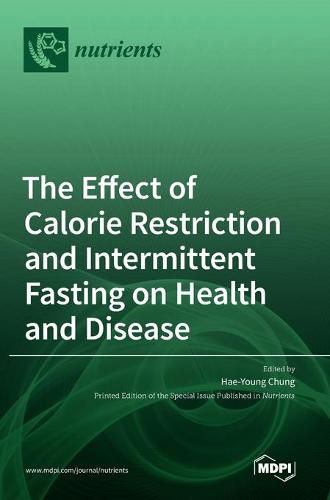Readings Newsletter
Become a Readings Member to make your shopping experience even easier.
Sign in or sign up for free!
You’re not far away from qualifying for FREE standard shipping within Australia
You’ve qualified for FREE standard shipping within Australia
The cart is loading…






This title is printed to order. This book may have been self-published. If so, we cannot guarantee the quality of the content. In the main most books will have gone through the editing process however some may not. We therefore suggest that you be aware of this before ordering this book. If in doubt check either the author or publisher’s details as we are unable to accept any returns unless they are faulty. Please contact us if you have any questions.
Recent biochemical studies indicate that calorie restriction (CR) is a widely accepted method for anti-aging intervention. CR and intermittent fasting (IF), which involves reduced calories but proper nutritional intake during specific periods, are interventions that can consistently promote health benefits, delay biological aging, and extend both average and maximal lifespan. Furthermore, CR can modulate age-related diseases such as Alzheimer’s disease, atherosclerosis, diabetes, obesity, cancer, and others. Advances in omics technologies have provided a technical breakthrough that enabled the investigation of DNA, RNA, proteins, and other cellular molecules and their comprehensive interactions in a biological context. Nowadays, it is possible to analyze and integrate biological processes that occur in aging systems at the molecular level using state-of-the-art techniques such as next-generation sequencing (NGS), proteomics, lipidomics, metabolomics, and epigenomics. Omics technology and systems gerontology provide predictive information on CR effects, molecular mechanisms, and pathways underlying the anti-aging actions of CR and IF. This Special Issue, The effects of calorie restriction and intermittent fasting on health and disease , focuses on the effects of calorie restriction and intermittent fasting on age-related inflammation, autophagy, metabolism, longevity, mitochondrial function, and age-related diseases.
$9.00 standard shipping within Australia
FREE standard shipping within Australia for orders over $100.00
Express & International shipping calculated at checkout
This title is printed to order. This book may have been self-published. If so, we cannot guarantee the quality of the content. In the main most books will have gone through the editing process however some may not. We therefore suggest that you be aware of this before ordering this book. If in doubt check either the author or publisher’s details as we are unable to accept any returns unless they are faulty. Please contact us if you have any questions.
Recent biochemical studies indicate that calorie restriction (CR) is a widely accepted method for anti-aging intervention. CR and intermittent fasting (IF), which involves reduced calories but proper nutritional intake during specific periods, are interventions that can consistently promote health benefits, delay biological aging, and extend both average and maximal lifespan. Furthermore, CR can modulate age-related diseases such as Alzheimer’s disease, atherosclerosis, diabetes, obesity, cancer, and others. Advances in omics technologies have provided a technical breakthrough that enabled the investigation of DNA, RNA, proteins, and other cellular molecules and their comprehensive interactions in a biological context. Nowadays, it is possible to analyze and integrate biological processes that occur in aging systems at the molecular level using state-of-the-art techniques such as next-generation sequencing (NGS), proteomics, lipidomics, metabolomics, and epigenomics. Omics technology and systems gerontology provide predictive information on CR effects, molecular mechanisms, and pathways underlying the anti-aging actions of CR and IF. This Special Issue, The effects of calorie restriction and intermittent fasting on health and disease , focuses on the effects of calorie restriction and intermittent fasting on age-related inflammation, autophagy, metabolism, longevity, mitochondrial function, and age-related diseases.